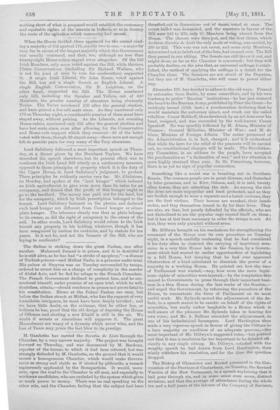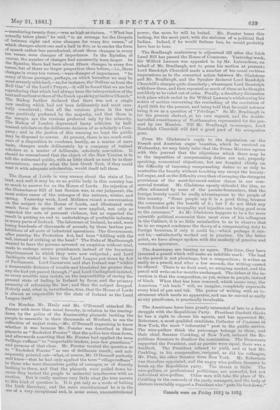The Bishop of Gloucester and Bristol presented to the Con-
vocation of the Province of Canterbury, on Tuesday, the Revised Version of the New Testament, in a speech explaining that it had gone through six, and in some sense even seven, distinct revisions, and that the average of attendance during the whole ten and a half years of the labours of the Company of Revisers, —numbering twenty-four,—was as high as sixteen. " What has actually taken place," he said, "is an average for the Gospels of between eight and nine changes for every five verses," of which changes about one and a half in five, or to render the form of speech rather less paradoxical, about three changes in every ten verses, were changes of importance. In the Epistles, of course, the number of changes had necessarily been larger. In the Epistles, there had been about fifteen changes in every five verses, but of these no larger proportion than before,—i.e., three changes in every ten verses,—were changes of importance. "In many of those passages, perhaps, on which hereafter we may be most severely criticised,—as,for instance, the' Deliver us from the Evil One' of the Lord's Prayer,—it will bo found that we are bat reproducing that which had always been the interpretation of the best and earliest writers of the Greek-speaking primitive Church." The Bishop further declared that there was not a single now reading which had not been deliberately and most care- fully considered ; that all the versions given in the text were positively preferred by the majority, and that those in the margin are the versions preferred only by the minority. The Bishop of London deprecated hasty criticism by half- trained scholars on the deliberate decision of so scholarly a Com- pany; and in the justice of this warning we hope the public may be disposed to concur. At present, there is too much evid- ence of a disposition to condemn hastily, as a matter of mere taste, changes made deliberately by a company of trained scholars as a matter of deliberate, scholarly conviction. It should be remembered that the object of the New Version is to tell the unlearned public, with as little shock as need be to their associations, exactly what the best Greek Text, if they could read it with adequate scholarship, would itself tell them.



































 Previous page
Previous page